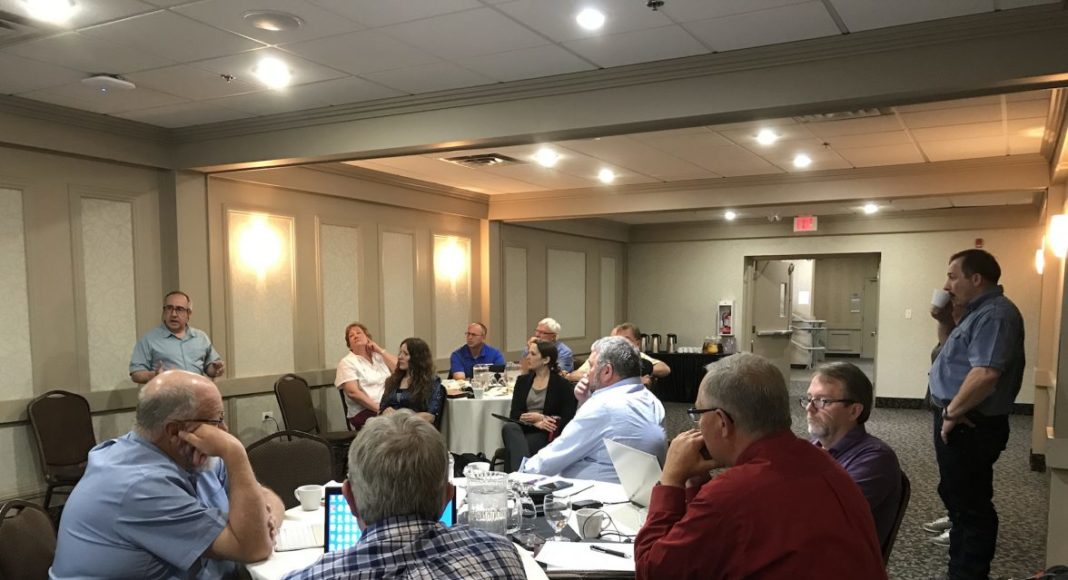[deck]The initiative seeks to provide sustainability and transparency in the industry.[/deck]
The Potato Sustainability Initiative (PSI) grew out of a request from McDonald’s in 2010 for its growers to track and report on the adoption of integrated pest management (IPM) practices.
By 2013, the PSI had evolved into a comprehensive and groundbreaking collaboration that included customers, processors and growers in both the U.S. and Canada – a program that promoted and measured practices important to worker safety and sustainability, including water and energy conservation, waste and greenhouse gas reduction, reduced chemical use and protection of air quality.
Each year since, the PSI has further expanded and evolved, keeping pace with ever-increasing demands from consumers and supply chain members for sustainability and transparency. As an example, Eric Ritchie notes that more and more potato-buying companies have created top-level management positions with a sole focus on sustainability issues.
“Indeed, many companies have entire teams working to ensure they are aware of what is happening in their supply chains, and can report on progress to consumers, shareholders and others,” notes Ritchie, who is the PSI chair and also senior agricultural manager at McCain Foods.
On the consumer concern front, Ritchie pinpoints two specific issues that have become particularly important since PSI began: greenhouse gases and pollinators.
“Both have been regularly featured in the media,” he says, “including evidence of climate change impacting weather patterns that consumers are exposed to, and reports about the health of both honey-bees and wild pollinators.”
For his part, Vernon Campbell, PSI governance team member and the owner of Mull Na Beinne Farms in Kensington, P.E.I., has seen more and more consumer demand for information about food production, and for products deemed to have been grown in a sustainable manner.
“This trend had begun before the PSI was initiated,” he says, “and I’m sure will only increase into the future.”
Mike Wind, also a PSI governance team member, agrees.
“Consumers want to know where their food is coming from and how large a footprint it took to produce that food,” says the owner of Windiana Farms in Taber, Alta. Consumers want to understand the impact that food production has on soil and air, he says, as well as how much water, fertilizer and chemicals are employed. “They are also concerned that child labour is being used.”
In terms of specific demands from retailers and distributors related to sustainability, Dr. Thomas Green, director of the IPM Institute of North America, points to Walmart and Whole Foods Market as prominent examples. These retailers, which operate on both sides of the Canada-U.S. border, have supply chain programs wherein they collect information and also encourage and recognize continuous improvement. Green says there are other examples in other regions such as Europe and Asia as well.
Measuring improvement
PSI is in the early stages of measuring growers’ nutrient use efficiency and irrigation efficiency, the reduction in pesticide risk and greenhouse gas emissions, waste production/recycling and worker safety.
“We are still in implementation and not ready to report on these metrics right now,” says Ritchie. “We’re working to improve data collection and to establish baselines first. Some of the metrics require information that growers have not had to collect before and do not readily have on hand, including well water depth and pump pressure, which are required to calculate greenhouse gas reduction, for example.”
Third party certification of the audit process by the Global Social Compliance Program should be finalized in 2018.
Campbell has completed the PSI annual survey many times and has also been audited, and therefore can provide some first-hand observations.
“[The process] has forced me to put ‘pen to paper’ and document many of the sound agricultural practices we already employ on our farm,” he says. Campbell adds the vast majority of potato producers has made great strides toward the protection of the environment and he views participation in the PSI as a systematic way to demonstrate sustainability to both customers and consumers.
Besides third-party audit certification, the PSI is also benchmarking its standards against the Sustainable Agricultural Initiative Platform’s Farm Sustainability Assessment, a program recognized by many multinational food companies. This move will help PSI participants communicate their PSI rating to buyers. However, the benchmarking is not yet complete and no completion date has been set, as the platform must first complete work to benchmark its standards against Canadian provincial legislation.
In August, the PSI also began a partnership with The Sustainability Consortium, a move that will drive continuous improvement in both programs, and allow growers participating in either program to compare their performance against growers in the other program.
Celebrating progress
Since the PSI began, the number of participating growers has increased to more than 500, and the number of processors and potato product buyers has doubled.
“This is very important towards our goal of a single program for sustainable potato production… to reduce the burden on everyone in the supply chain by eliminating the duplication of effort that would be required if each buyer and processor had their own program that growers had to respond to,” says Ritchie.
Wind notes while meeting consumer expectations for more information and transparency through the PSI has meant a lot of costs and extra work for producers, they probably did all the things consumers are looking for but just never recorded them. Now that growers are participating in the PSI, they are more aware of consumers’ concerns and of the details involved in taking care of the environment and producing the best and safest food possible.
“We have always been concerned about these things, considering we would like to pass our farms to future generations,” says Wind.











